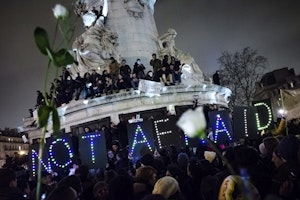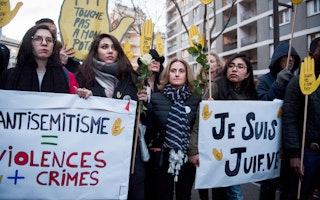Fighting Denial and Suspicion in France
By Rokhaya Diallo
There is no doubt that there will be a pre- and post-Charlie Hebdo era for France. The act of terrorism left a mark on the nation that will not fade anytime soon. But while France was changed by the event in many ways, what I believe will regrettably remain the same is the level of denial around the conditions that would set the stage for such monstrous actions.
So far we have refused to accept that what happened at Charlie Hebdo is a French problem. Only if we treat it as a French problem and learn from our mistakes will we be in a position to deter such acts of desperation in the future. France has to admit that it has failed to take bold actions against social injustice or integrate citizens of migrant background.
Terrorist brothers Chérif and Saïd Kouachi were born and raised in France. They are not a case of imported radicalization. They were radicalized here, on French soil. The Islam they claimed to represent was imagined by two young men seeking an identity and a sense of belonging. Their actions have to be analyzed against a backdrop of exclusion and inequality. I am by no means trying to justify terror—their actions were unspeakable. But one has to wonder how our country could produce people so desperate that they could only find salvation in a massacre.
The first step in fighting extremism is to break through our denial. The republic wants to think of itself as a place where minorities live in harmony with their society. “Liberty, equality, fraternity” are the principles we aspire to. Well, I’m sorry to break the news, but since the 1983 March for Equality and Against Racism—the first-ever response in France to a wave of racist crimes against people of Arab and African background—very little has changed.
There were demonstrations in the early ’90s and then riots in the mid-2000s in which youth from the suburbs of Paris and other French cities expressed their rage about social inequality, police brutality, and discrimination. This anger and frustration went unheeded by our leaders. It did not translate into concrete action to promote equal opportunities for all French citizens. It did not even lead to the most obvious acts of accountability and justice: the police officers responsible for the 2005 deaths of two French Muslims, Zyed Benna and Bouna Traore, were never sentenced. This is how you induce resentment among a segment of the population.
Since the tragic events at Charlie Hebdo, suspicion has become the number one threat to France’s national unity. Muslims are looked at as tacit accomplices to the crime of the decade. A friend of mine shared a story from her workplace. They were observing a minute of silence in remembrance of the victims. Being the only French person of Arab background in the office, her colleagues stared at her to ensure that she was really in solidarity.
It reminded me of my own experience the evening of the attack, when I appeared on a special radio program to comment on the tragedy. The discussion took an unexpected twist when Ivan Rioufol, a Le Figaro columnist, called on Muslims to unequivocally condemn the attack. Did I really have to voice my opposition to convince my peers that being Muslim does not make me a terrorist sympathizer? I thought of the four to five million Muslims across France that would face suspicion and be accused of condoning the attacks—people who will have to prove that they are more loyal to France than they are to Islam. The repercussions of these divisions will be detrimental to the future of our country.
More than 50 Islamophobic incidents across France, including many attacks on mosques, have taken place since January 7. Even prior to the attack, many documented how the French police disproportionately target men of African and Arab origin for identity checks. This is a disturbing reminder that we are not all equal citizens, and our stereotypes can overtake our judgment.
I was always proud that France has the highest number of both Muslims and Jews in Western Europe. This will change if we do not work to promote social cohesion. All communities are afraid and feel increasingly isolated. Anti-Semitic incidents have increased too, and many French Jews are afraid to go to synagogue or allow their children to go to Jewish schools. Many are considering moving out of the country. France will not be France if it forces its own people out.
The Charlie Hebdo atrocity is a test for French society and a lesson for French politicians. When the mother country rejects its children, the least stable will look for replacement parents. This is the time to learn from the past and create a common front, and for the government to acknowledge and tackle structural racism and social injustice—not cultivate fear and suspicion.
Rokhaya Diallo co-founded the anti-racist organization Les Indivisibles and is a board member of the European Network Against Racism. Both organizations have received support from the Open Society Foundations.
Rokhaya Diallo is a French journalist and activist. She is the founder and former president of Les Indivisibles.


